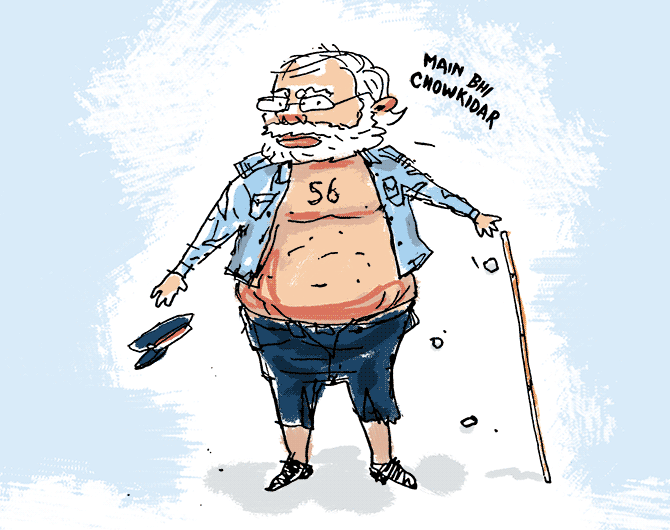'Twitterati on either side of the political fence needs to walk for a day or two in a chowkidar's shoes to understand how precariously India's unorganised sector teeters on the brink,' says Geetanjali Krishna.

The other day a friend asked me to search for the word chowkidar on Twitter.
Dozens of Twitter handles prefixed with chowkidar opened up.
Prefixing a hashtag to chowkidar in the search bar opened up another can of worms altogether.
As politicians, opinion makers and the obnoxiously opinionated battled it out over the humble epithet on social media, I found myself thinking of D P Singh, an actual chowkidar.
His life story isn't unique; in fact, it is pretty much like that of many others like him who have found employment in the city, thanks to the widening divide between the rich and the poor. But it shows how empty election rhetoric is.
Singh is from Gaddopur, a village outside Prayagraj.
His family has a small piece of land that does not yield enough to feed their growing numbers.
"A couple of years ago, when my younger brother's son got married, we realised that revenues from farming were just not enough," he says.
Dividing the tiny tract of land would have devalued it further.
Instead, Singh took up a job as a security guard in Delhi, leaving his younger brother to till the family land.
Their agricultural income has further dipped and today, the lion's share of Singh's salary of Rs 14,000 per month goes into supporting his eight-member family back home.
In Delhi, Singh works as a guard on a 12-hour shift in a private house.
"I share a tiny room with two beds with three other men," he says.
"Two of us work nights; we sleep during the day while our other two roommates work."
His monthly expenditure is over Rs 5,000, and Singh is acutely conscious he needs to save more.
"My daughter is in college now and I need to save money for her marriage," he says.
In January this year, Singh's mother had a stroke. "I had to rush home to be with her," he recollects.
"When I returned after a week, my employer deducted my salary as I only get two holidays in a month."
Singh borrowed Rs 50,000 from his roommates to pay her hospital dues as he had no savings.
A month later when she died, he had to take unpaid leave for 15 days again.
"Since then, I've been repaying my loan in small installments," Singh says.
He now works overtime on his off days to make extra cash.
He also cleans cars after his shift ends at 7 am.
Sometimes, he goes to the neighbourhood temple or gurdwara to get a free meal.
Every paisa counts, he says, for his roommates expect him to repay the loan within the next four months.
"I worry what will happen if I fall ill," he says. "That's why I'm thinking of calling my brother's son to Delhi -- with my contacts, I can easily get him a job as a chowkidar."
As Singh dreams of adding another kin to the ranks of chowkidars, I muse that Twitterati on either side of the political fence needs to walk for a day or two in their shoes to understand how precariously India's unorganised sector teeters on the brink -- even when on paper they may earn more than the minimum wage.
Till then, their election rhetoric will remain as empty as the Jan Dhan accounts of Singh and lakhs of others like him.












 © 2025
© 2025